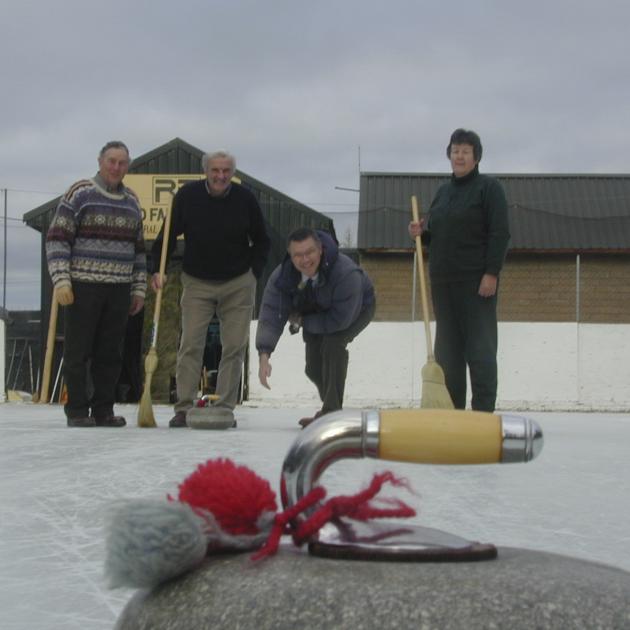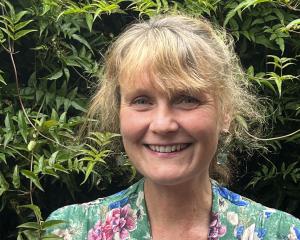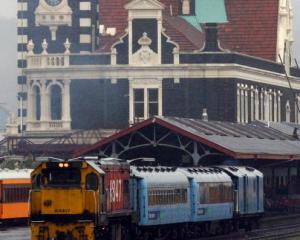
"There will always be unfinished business," David Parker sighs, looking back on almost a quarter of a century in politics.
By most measures he has had an excellent career: after kicking off by doing what many thought was impossible and winning the rural seat of Otago for Labour, the now 65-year-old lawyer became Attorney-general, among several other Cabinet posts.
But Mr Parker is also the deputy and acting party leader who never made it to the top of the greasy pole, and the finance spokesman who became the associate minister but never got the senior role he deeply desired.
It has been a fulfilling career with many achievements but it ends with, possibly, a nagging sense that Mr Parker never quite managed to achieve everything that he wanted too. Would he have liked to have been finance minister, or to have held an even greater post?
"Maybe," he reflects.
"You wouldn't stand if you didn't think that you could do the job. Coulda, woulda, shoulda . . . I'm absolutely privileged to have been elected by my fellow New Zealanders to represent their interests in Parliament. I've done it to the best of my abilities.
"If I had different roles would I have done some things that I hadn't done? Probably, but I'm pretty happy with the way things rolled."
Little did former National Energy Minister Max Bradford know what forces he would unleash when he came to Dunedin in the late 1990s to try to sell his government’s electricity reforms.
In the audience for his public meeting was David Parker — a Roxburgh-born and Dunedin-raised lawyer who had already made a mark in his community by helping to set up the first Community Law Centre while studying at the University of Otago.
"Dunedin, of course, is a Labour-friendly town, proudly so," Mr Parker said.
"So my values that I learnt in Dunedin growing up here, which I still hold dear, which are a mixture of personal responsibility, thrift, egalitarian outcomes. Jack is as good as his master or his mistress, and they are a wonderful set of values."
As Mr Parker listened, he became more and more angry. Already a member of the Labour Party, his ire was the catalyst for taking a more active role in local electorate affairs.
Then Dunedin North MP Pete Hodgson quickly saw Mr Parker’s potential and he became electorate chairman, then thanks to Mr Hodgson’s persuasive powers the candidate for Otago — the seat which is now Waitaki, and which few expected him to win.
"Pete taught me good campaigning skills, and I just got involved and I thought I might have something to offer," Mr Parker said.
"Then they needed a candidate in the Otago seat, which at that stage ran from Mount Cargill up to Oamaru, Queenstown, Alexander, up to Haast Pass, and yeah, I'm running."

"I really used to love representing constituents," Mr Parker said.
"I felt like a professional driver, but you come to realise that the vast majority of New Zealanders live good lives. You know, they look after their families well, they participate in social organisations like service clubs, or school committees, or churches, whatever their thing is, and, you know, they pay their taxes, and they make society better than it would otherwise be, and you don't get that understanding of people quite as much as a list MP.
"I think one of the other dangers for some list MPs is that you can become too engaged on particular issues. It drives me crazy how much political capital is wasted by so many people on identity issues these days. We're already one of the most liberal accepting countries in the world, and yet we put so much energy into some of those issues.
"I'm not denying their importance to some people, but they can get in the way of concentrating on economic matters and issues of economic fairness and prosperity, which in the end are also often the key to the delivery of other services like education and health."
In Opposition Mr Parker soon settled down into what became his specialist subjects for most of his political career: law reform, the environment and economics. For his sins, as his career evolved, Mr Parker became his party’s expert on the gargantuan, convoluted and much criticised Resource Management Act.
"The processes under the RMA became more and more convoluted. It took forever to change a plan, took forever to change national direction, which sort of gives guidance to councils, and constrained subdivisions and other housing developments in a way that drove up the price of not just new sections, but that flows through to the cost of all housing, including existing houses," Mr Parker said.
"When I was Minister for the Environment we introduced fast-track — we didn't go so far on fast-tracking as the current government has, which was to override provisions in the Conservation Act and the Wildlife Act. But in terms of, you know, getting fast consents, we proved that that can be done. And, you know, it's stripped out a lot of time and cost from the process.
"A lot of the provisions that were in our replacement for the RMA that the new government repealed will be carried forward in their legislation. So, you know, I think progress will be made on that issue . . . . I think Chris Bishop's competent, and I think we'll get to a settled place."
That is a compliment which may surprise some, but loyal as Mr Parker is to Labour he has never been a blinkered partisan. That has earned him great respect from all sides of the House, typified by a generous compliment from Prime Minister Christopher Luxon when Mr Parker’s imminent retirement was announced.
"We are political opponents testing each other, but we're not enemies, and there is a difference," Mr Parker said.
"Democracy is a fragile and valuable thing, and you see what's happening in other parts of the world now where polarisation is breeding a discontent with democracy, and you see these instances where people say that they'd rather have an alternative to democracy.
"I think that should worry us all, and really, democracy belongs to everyone, and it relies on everyone to engage in it and defend it, and participate in it, and criticise those that would tear it down."

"I would have stood down at the last election, but for some unfinished business that I had in respect of what I think are unfair tax settings in the country, where people who work for a living and earn their income through salary and wages pay tax on every dollar they earn," Mr Parker said.
"The average middle class person in New Zealand would probably spend around 30% of their income across income tax and GST on taxation, whereas the wealthiest people in New Zealand pay about a third of that, a third to a half, and it's a matter of record that I was disappointed that some of the things that myself and Grant Robertson had proposed in respect of that didn't come to pass, and so I stayed on to try and influence those outcomes for the future.
"This comes back to the ethic that we have in Dunedin, and I really want people to thrive and be entrepreneurs and succeed, but everyone should still pay their fair share of tax, and if they don't, the wealth divisions that we already have in society as a matter of arithmetic get bigger year by year, and we already live in a country where the top 1% of wealth holders own 26% of everything."
Add in improving New Zealanders’ savings habits, possibly through an Australian-style retirement savings scheme, and improving air and fresh water quality, and there are plenty more unticked items on the Parker to-do list.
However, he is now the longest continuing-serving Labour MP (Damien O'Connor has served longer, but not in one stretch) and it is time to pass the baton.
"You can't do this forever, and neither should you," Mr Parker said.
"I haven't advanced any plans in advance of stepping down . . . I'll probably hang my shingle up again as a lawyer, at least part-time, and, yeah, life will carry on. [last year] I knuckled down and wrote the best part of the book, actually, on some of my ideas, and, you know, one day I might finish that. On the other hand, I might not get around to it."
In his own words
Leadership
"Phil Goff would have been a very good prime minister. Some other people that I've been there with that would have been good prime ministers include, I thought Russel Norman in the Greens, Jeanette Fitzsimons, that would have been good, Simon Bridges from the National Party would have been a good leader, you know, there's any number of people who could have led the country."
Otago
"We've got this incredible natural bounty here. It's the wildlife on the Otago Peninsula, those beautiful snow-fed rivers that we've got that glisten and carry fresh water over those gravel bases, beautiful mountains, the wide open tussocklands, or the little coastal settlements like Karitane. We're absolutely spoilt for choice, and I love all of them."
Social Media
"I believe that democracies are being undermined by these tech barons, who I call middle and maniacal, tax-avoiding tech barons. They're selfish, they're greedy, how much money do they need? They owe none of the duties that you owe in your newspaper or any television in New Zealand or owes about balance or being responsible for defamation. They sell advertising to fraudsters who are trying to rip New Zealanders off their savings and do so successfully at times. The distrust that is bred of all authority figures, whether it's the police, the medical fraternity, or politicians, or the media. I see the irresponsible social media platforms as being the major problem."
David Parker timeline
2002: After a career in business and law, wins the Otago seat for Labour.
2005: Loses Otago to Jacqui Dean by 1995 votes but re-elected as No 37 on Labour list. Joins Cabinet as Attorney-General, Minister of Transport, Minister of Energy, and Minister Responsible for Climate Change Issues but briefly resigns after allegations he had filed an incorrect return to the Companies Office. Cleared and reinstated to Cabinet about three months later.
2008: Defeated by Ms Dean in Waitaki, re-elected as No 17 on Labour list. Leading figure in Phil Goff’s shadow Cabinet.
2011: Defeated in Epsom by John Banks, re-elected as No 4 on Labour list. Initially a leadership candidate, stood aside and backed David Shearer. Becomes finance spokesman.
2013: David Cuncliffe becomes Labour leader, David Parker is his deputy and finance spokesman.
2014: Re-elected as No 2 on Labour list. Interim Labour leader after David Cunliffe steps down but finishes third in leadership contest. Declines finance role but takes on foreign affairs.
2017: Finishes third in Epsom but Labour wins power again: re-elected at 10 on Labour list. Made Attorney-General and Minister for Economic Development, Environment, Trade and Export Growth and an associate finance minister.
2020: Re-elected as No 2 on Labour list. Reappointed Attorney-General, Minister for the Environment, and associate Minister of Finance, becomes Minister for Oceans and Fisheries, Revenue and, briefly, Transport. In 2022 becomes first MP to test positive for Covid-19.
2023: Re-elected as No 13 on Labour list. Becomes Labour’s foreign affairs spokesman.
— David Parker delivers his valedictory speech to Parliament on May 7.












